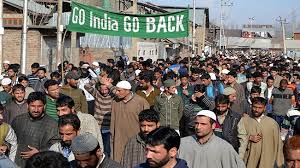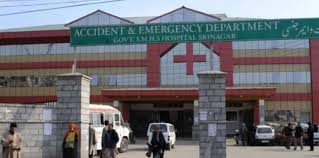Kashmir’s narrative has made a grand shift from “azadi” or freedom to the “complete destruction of India”.
The slogan of “azadi” that characterised the essence of Kashmir insurgency in the 1990s now serves as a thin veil for the real objective of militants, their supporters in the Valley — to work for the annihilation of India.
On Saturday evening, groups of youth while strolling at Boulevard chanted “Jung ladenge Hindustan ki barbadi tak” (The war will be fought until the destruction of India”. They were loud enough to be heard by the domestic tourists, who looked at the boys with a mixed look of surprise and shock.
This narrative has been borrowed from Pakistan’s state and non-state actors, who swear that they will wipe out India out of the world map. Hafiz Saeed’s words echo not only in the privacy of homes but also in the streets of Kashmir. That is the new grim reality of Kashmir.
Pakistan has seized the mindset of Kashmiri youth, who were born and brought up during what is modestly called “turmoil.” Pakistan and its agents in Kashmir — militants and overground workers — have taken full advantage of the fact that these youth born in the late eighties to early 2000s have seen no semblance of normalcy, peace and order and the good side of India.
For them, every Indian soldier is their enemy. They are watching the multiplication of guns and expansion of graveyards and they blame the whole thing on India – something that Pakistan makes them believe through its sheer propaganda and exploitation of some ugly situations — like the one that took place on April 1, when the killing of 13 militants, four civilian protesters and three soldiers darkened the mood across the Valley.
Local youth joining militancy — some poorly trained and others hardened fighters — has become a major area of concern. This is becoming the story of guns versus guns in each and every encounter and its narrative travels far beyond the encounter sites and the law and order situation. When hospitals are flooded with the injured, some of them with pellets in their eyes, it becomes a toxic anti-India narrative flared by a mix of fact and fiction, relayed by the social media and propaganda machinery of Pakistan.
These propagators work 24×7. And, they succeed because the frustrated and angry youth after each killing find the political apparatus missing. There are some soothing tweets, which have no meaning when the Internet is down during and after the encounters, like it happened on Sunday and Monday. These soothing messages in the cyber world are no substitute to the interaction on the ground. The political leaders have cocooned themselves in their homes and communicate through tweets.
The Kashmiri youth is angry at the corruption in the system, they think their degrees and skills have been rejected in favour of the political activists and the moneyed people. They find that there is no alternative left before them and they have started picking up guns. They target soldiers because they are visible. The rest of the institutions have either collapsed or given in to the dictates of the disruptionists like separatists, who see their shutdown calls as a panacea, and the government obliges them by shutting all the institutions.
This is giving birth to the narrative of destruction of India. There is no realistion that this vow to destroy India is harming them too.
The local militants — for whom the civilian protesters are risking their lives by marching to the encounter sites — have not asked a single question about the abduction and killing of a youth from Hajin, Bandipora, last night, and inflicting near fatal injuries on two women. Weren’t they Kashmiris?
Kashmir and growing anti-India narrative






